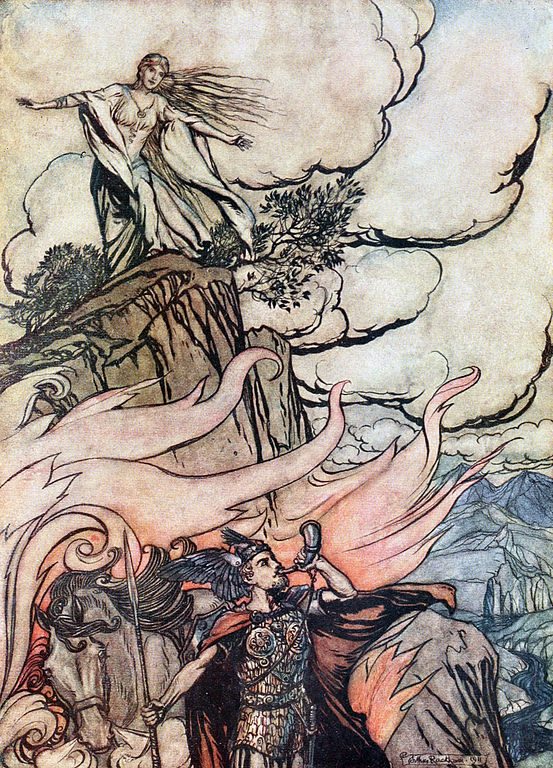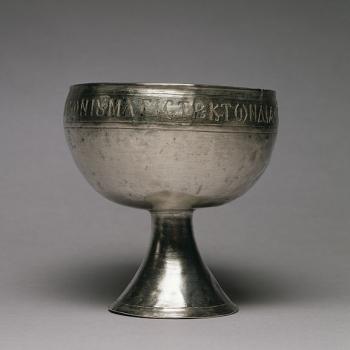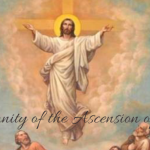
Siegfried leaves Brünnhilde in search of adventure (1911), by Arthur Rackham (1867-1939) [public domain / Wikimedia Commons]
*****
This is from a private correspondence with a very friendly and fair-minded atheist, who goes by the nickname, “Comrade Carrot-Blog Vegetarian.” He has agreed that it would be made public. Unlike the vast majority of atheists I have met online, he is actually curious about my spiritual journey, minus any hint of condescension or the usual atheist views of Christians (that we are ignorant, anti-science, given to following a myth-like God akin to leprechauns, irrational, pretentious and bigoted, etc.). Bottom line: it’s great discussion within a friendship that has constructive value. This is what it’s about: simply talking and listening to each other. It’s entirely possible: at least with the right kind of person on both sides. His words will be in blue. My wife Judy’s words will be in green.
***
See the first installment: Dialogue with a Friendly Atheist #1: My Pagan / Occultic Period (8-3-17)
*****
As regards my own experiences, my memory is rather spotty as to several details of my conversion/deconversion history. Much of it is still there, but probably not in order, and not with enough clarity to construct the sort of organized narrative that would make for a good story. I did have the foresight to document many of my thoughts and experiences at the time which would help immensely. Unfortunately, I believe those notes to be buried in some obscure file on one of the several dozen hard drives which are somewhere in my possession. Hopefully one of these days I’ll get the time to track it down while it’s still recoverable. I’m sort of uncomfortable immortalizing very many details of my personal life on a blog post anyway. I have a rather limited online presence (no Facebook…etc). If there was something in particular that interests you however, I don’t so much mind sharing my thoughts or views generally, or having more of an abstract conversations about some of my experiences.
*
Fair enough. You seem to have had firsthand experiences of sehnsucht or something like that (and to know a lot about C. S. Lewis), in addition to your reactions to music, that you alluded to (apparently similar to my own, as regards Wagner). Any of that would be of high interest to me. But I don’t want to make you feel that you are “exposing your thoughts” against your will (i.e., in public).
I don’t know anything about your past thus far, except little hints that you have revealed in our present discussion. I assume you were some sort of Christian.
Anything along the lines of speculations about subjective internal feelings and emotions and imaginative aspects generated by nature or music and how that is interpreted, minus God or even “spirit” of any sort would be extremely interesting to me. We have the experiences in common, and I think most human beings have these sorts of feelings. Explaining and interpreting them is the fascinating thing.
I was mostly taking advantage of your offer to indulge some of my curiosities about your response to my initial comment on Pearce’s blog :-) But you’re welcome to probe a bit if you’d like. I’m not completely sure which topics were of interest to you aside simply from accounts of an atheist’s deconversion.
*
What I mentioned above would be some of those, and anything regarding deconversion and what causes it to occur in a Christian who winds up in agnosticism and atheism. So we’ll just go wherever you want to go.
I just uploaded my old compilation about sehnsucht to Patheos. It was on Internet Archive only. I’ll be transferring several of the papers on my Romanticism web page to Patheos. It’s a long process, because I have so much older material from Blogger or even older website formats sitting out there: now in obscure places. Talking about any of the thoughts there — perhaps more abstractly and less “personally” (as you like) — would be a lot of fun.
I don’t mind sharing my thoughts and experiences generally. I’m fine with the sorts of questions it looks like you have, and I’ll let you know if that changes.
*
Great. I think the dialogue is fabulous, for both sides to read.
*
I have read a fair bit of Lewis. He’s never been among my favorite Christian writers, but there are several reasons why folks (particularly those who spend any time engaging with contemporary Christians) ought to read him. Merton is among them, incidentally, and as pleased as I was to find him on your list, I was similarly pleased to find two books I haven’t read, and now will.
*
Great. If you’re in the mood to read Christian books, be sure to read Chesterton, and particularly
The Everlasting Man: which is a fascinating treatment of how mythology and
paganism actually foreshadow Christianity. Lewis said this book had more influence on him than any other and made amusing observations about how he’d like several books the most, during his atheist period, and that invariably they were only hampered by the fact that the authors were Christians. Otherwise, he found them quite wise and profound.
*
In any event, I’m certainly acquainted with the feeling Lewis identifies as sehnsucht. I don’t recall ever being consumed by it (at least not it, specifically), as he was; But then again, I’ve never been in quite the position that he was. I generally find that, when this specter of tormented alienation from the transcendent does rear its head, it’s a consequence of (1) A very rigid metaphysic, and (2) the lack of a compensating theology (or similar view). I don’t ever recall a time in my life when both of these things were true for me at the same time.
*
So what would be the sort of things that initiated these experiences for you? Was it music? Also, nature? That’s what does it for me. And how do you interpret it, now from an atheist perspective? I just had a
dialogue with another atheist (“Ficino”) who also acknowledges the experience but has no explanation for it. I was just happy that he had the same experience. What bugs me to no end are atheists who just blow off everything a Christians claims to have experienced, as if it is all rubbish and self-induced fantasies. It’s very refreshing to find two now, who can agree that it is a fascinating experience worth pondering and analyzing a bit.
*
For reference, I was raised in the Evangelical tradition, later becoming more of a non-denominational protestant. I then found my way into a form of Calvinism which eventually slid into (or, perhaps, naturally entailed) a form of dystheism.
I ended up developing that into a full blown synchretic theology, borrowing from multiple sources including some of the gnostic traditions, and from Jewish writers in the post-Holocaust school. The early years of this position (before it stabilized) are where some of the biggest gaps in my memory are – Of all the places!
*
I would have massive disagreements with these strains of thought, but that’s too big of a diversion, and best left alone.
*
But I was closest to identifying directly with Lewis at this point relative to any other. I was dealing with all sorts of existential questions and questions regarding the nature of God, at a time when the answers made real, tangible difference to me.
*
I can see that there might be a connection in this period, because in formulating your conception of God, you would perhaps be more open to the sorts of experiences we are talking about: probably a lot like I was in my occultic / pagan period.
*
A piece of my heart is still in that place, and I also have something of a doppelganger who has continued to evolve as a Christian, even though, strictly as a matter of belief, I’m not there anymore.
*
Fascinating, and a neat way of putting it!
*
I say “even though”, but in my case “because” might be more appropriate. That would be something of a digression.
*
If you ever want to follow that digression, it sounds like another intriguing discussion to have.
*
In any event yes, music is a bit of an intractable problem! In fact, explaining and interpreting the emotional effect of music on the listener is only half the challenge. It’s another matter to explain the sense in which music could express (let alone contain) emotional content at all. It’s not clearly representational (of some feature of the world) like a painting would be. It’s a language of some kind, but even then it doesn’t have the semantic features of a conventional language, and it isn’t merely descriptive of emotion. A joyful song doesn’t communicate the statement “there is joy”…it communicates “joy”. It’s something more like a smiling face.
*
You make reference to a more specific musical experience — the experience of sublimity — the experience of being utterly spellbound and awestruck by a piece or segment of music. One of my own go-to examples is The David Blamires Group’s Deep Is The Midnight Sea [link]. There’s an interlude 2:47 into the song with an angelic 3 part vocal harmony that captivates me every time I hear it.
*
Yeah, the three-part harmony was very nice in that You Tube piece. The equivalent for me would be many moments in Beach Boys music, with the wonderful harmonies.
*
There’s a related (but distinct) experience, I’ve found, among people who play, compose, or engineer music; It’s less like a feeling of sublimity and more like an intense appreciation of perfect order; There’s a moment when one finds the chord, or the right blend of sound and it simply “works”. It’s a bit like the moment when 50 metronomes at 50 tempos synchronize for a couple of beats.
*
What’s interesting about the musical experience is that, while it’s emotional, it’s not merely so. It’s especially not merely emotional in the sense that it brings into focus a person’s own emotions. It’s more likely to completely disassociate us from our own emotions, which is why it often has such a therapeutic effect. I think this is, in large part, both what characterizes the musical experience, and the explanation for its allure. It also explains why we often seek out, through music, emotions that we would otherwise go to great lengths to avoid.
*
Good music (if only for a moment) pulls us out of the endless cycle of desire and satisfaction (of desire), and it temporarily exempts us from the project of always running after pleasant emotions and away from unpleasant ones. It puts us into dialogue with the emotions themselves. A sad song allows us to examine (depending on your metaphysics) the “form” of sadness, or the concept of sadness (etc.) without bogging us down with the question of what it is, for me, to be sad. We’re well acquainted with that experience. Music helps us to understand it, and to derive meaning from it…and maybe even to appreciate it. It gives us a more direct means of accessing a concept of immense import to us, as human beings, without the self, or the body getting in the way and trying to mediate.
*
This is truly extraordinary analysis of music: some of the best I have ever read, and I’ve read a lot about it, believe me (but perhaps not much along the lines of actual aesthetic analysis). I can literally do nothing here but bow to your terrific eloquence and thoughtfulness. It’s way beyond anything I have even thought about music, so I am thrilled to read such things. I do resonate with it. As I said, I find it very difficult to write about the experience or aesthetics of music (as opposed to the music itself, that I write a lot about). Perhaps someone who reads and/or writes fiction (I don’t) can do much better, because that’s all about descriptions and adjectives and word pictures.
You can do it, being a collector and producer and lover of sounds, and also having thought about things like sehnsucht. Listening to Wagner elicits these sorts of things in me, and it goes into mythology and mysticism, too (if that is something different). Kudos again for these amazing descriptions. I totally agree!
Your wife though has a rather unique response to music that I became intensely curious about upon reading. I don’t have anything like that experience, nor can I recall having heard anyone mention anything like it before. The divide between music and the visual arts in modern aesthetics is generally considered to pretty clear, mostly for straightforward reasons. It occurs to me that experiences like hers threaten to break quite a few theories! I’m going to do some digging and some chewing-over on this when I get the time. I also appreciate the links regarding theistic romanticism. Large portions of that are new to me, and I plan to dig into that too.
*
I went and asked my wife Judy and here’s what she said (basically transcribed):
It’s an exhilarating yearning for something beyond this world, and a sort of ecstasy, and seems to take me to other worlds, almost like a near-death experience; other-worldly, beyond the imagination. I envision things like a photographer sees photographs. An example would be seeing the clouds at sunset with beautiful colors, but more vivid. Everything’s exaggerated: the colors and beauty and contrast, etc. Or, like a forest with the sun filtering through it on a misty day. Or reaching heights on a mountain, analogous to emotions.
I asked her specifically about what she sees when listening to Beethoven’s Ninth Symphony:
I see shiny brass instruments with the sun creating patterns on them that dance.
And Mahler’s First Symphony (one of our favorites):
Yearning and longing for something; not as visual. But during the funeral march with animals, I see the animals doing the whole scene, with the female animals all dressed with rings of flowers and dressed in spider webs. The finale is like utopia and other-worldly: fields of flowers, with butterflies, like heaven.
Wagner’s Forest Murmurs is her favorite Wagner piece. Here is how she describes hearing that:
I picture a fawn lying in the dewy grass and the sun is beginning to rise and all the animals are sleeping with little blankets. They start to look out as the sun rises, and it turns into a wedding. It’s the feeling of being in love. The deer represent young love and it becomes deeper love as the piece goes on.
And the Rhine Journey:
Sparkling water: pretty blue-green, with purple. It looks like shiny pennies floating on the water, sparkling in the sun.
Siegfried’s Funeral March:
Typical funeral march like in England in the 1800s.
Gustav Holst’s The Planets (one of our very favorites of classical):
Like a psychedelic trip: swirls of colors and shapes and sounds. Seeing ice or glass shattering [cooler planets].
She says, generally, that “I always picture something, when someone says something or when I hear music.”
She loved and highly related to your four paragraphs about music, above, as I did.
For classical music, one of the most amazing and emotion-invoking moments, in my opinion, is in Mahler’s 10th Symphony: the Adagio or 1st movement (
You Tube: Leonard Bernstein with — I think, VPO). It reaches an incredible climax at 18:20, and then it gloriously proceeds along till 19:00, when the orchestra hits
The Chord: spectacularly dissonant and what I and not a few others regard as perhaps the most terrifying moment in all of music. It’s great to see Lenny conduct it, too: the one to whom Mahler meant so much and the conductor who was most responsible for introducing Mahler into the mainstream repertoire in the 1960s (not to mention also being a secular Jew after the Holocaust). What does
he feel in these moments, I wonder!? Commenters at the link say things like:
*
This symphony evokes so much emotion, it’s hardly bearable.
*
Comparable to nothing else — and so beautiful — it brings you to an other dimension of recognition and self-understanding — unbelievable!
*
At MusicWeb, commentator Tony Duggan described this section as follows:
The movement’s central crisis is where a searing brass chorale is followed by a shattering dissonance crowned by the long note on the solo trumpet that pierces the symphony like a hypodermic full of poison. From then on the symphony’s world-view is never the same again. Here Mahler is almost mapping his own and Europe’s psychic landscape at one and the same time.
My favorite recording of it is BPO/Rattle (1999).
All that with simply abstract music! Mahler’s 9th Symphony is equally intense and emotional. We know what he was going through. He had lost a child; now he was dying, and his marriage was shattered. We get to hear it in person at the DSO in December: having heard the 1st and 2nd in the last few years. I also get to hear Ring music in concert for the first time, next January. I guess the anti-Semitic associations of Wagner cause it it to be rarely played. But it’s certainly recorded a lot. So at age 59 I get to finally hear excepts at the symphony.*****


















